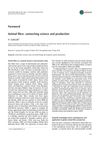 18 citations,
October 2018 in “Nutrients”
18 citations,
October 2018 in “Nutrients” Annurca apple extract promotes hair growth by changing hair follicle metabolism to boost keratin production.
 4 citations,
January 2010 in “Animal”
4 citations,
January 2010 in “Animal” Improving knowledge and practices in animal fibre production is crucial to meet market demands and potentially revive natural fibres.
 May 2024 in “Journal of functional foods”
May 2024 in “Journal of functional foods” Coffee bean residue extract helps hair growth by activating cell processes.
 13 citations,
December 2019 in “Nutrients”
13 citations,
December 2019 in “Nutrients” An apple-based supplement was found to stimulate hair protein production, which may help with hair growth.
 19 citations,
November 2018 in “Nutrients”
19 citations,
November 2018 in “Nutrients” Annurca apple extract may protect mouse hair from damage by chemotherapy and could help treat hair loss without promoting cancer growth.
 7 citations,
January 2010 in “Animal”
7 citations,
January 2010 in “Animal” Angora goat hair grows faster and produces more protein than cashmere goat hair, and certain hormones and nutrients positively affect hair growth and protein synthesis.
6 citations,
September 2023 in “International journal of molecular sciences” Oxidative stress worsens PCOS by damaging cells and disrupting metabolism, suggesting antioxidant treatments might help.
26 citations,
February 2022 in “Journal of pineal research” Melatonin affects skin and hair color and protects skin cells, with potential benefits for hair growth and skin health.
January 2021 in “Medpulse International Journal of General Medicine” March 2024 in “International journal of molecular sciences” Mitochondrial dysfunction is linked to various skin conditions and could be a target for treatments.
 December 2024 in “Health Science Reports”
December 2024 in “Health Science Reports” Topical metformin shows promise for dental and skin treatments, including periodontitis, hair regrowth, wound healing, and acne.
 December 2022 in “Medical lasers”
December 2022 in “Medical lasers” Low-level laser therapy may help with hair regrowth in alopecia areata but its effectiveness for psoriasis and atopic dermatitis needs more research.
11 citations,
June 2015 in “Scientific Reports” The mtDNA N haplogroup is linked to a higher risk of late-onset lupus and specific symptoms in Han Chinese women.

Low-level laser therapy combined with Neoptide improved hair regrowth better than either treatment alone in rats.
 19 citations,
July 2018 in “Mechanisms of Ageing and Development”
19 citations,
July 2018 in “Mechanisms of Ageing and Development” Eating less can slow aging and help keep stem cells healthy by cleaning out damaged cell parts.
1 citations,
January 2023 in “Chemical Engineering Journal”  32 citations,
January 2022 in “International Journal of Molecular Sciences”
32 citations,
January 2022 in “International Journal of Molecular Sciences” Melatonin, a hormone, can help protect skin from aging by reducing stress, inflammation, and damage, and may also help treat hair loss in women.
 33 citations,
January 2021 in “Aesthetic Surgery Journal”
33 citations,
January 2021 in “Aesthetic Surgery Journal” Low-Level Light Therapy (LLLT) is a safe and effective method for skin rejuvenation, acne treatment, wound healing, body contouring, and hair growth, but more well-designed trials are needed for confirmation.
 21 citations,
January 2019 in “Lasers in Medical Science”
21 citations,
January 2019 in “Lasers in Medical Science” Low-level laser therapy significantly increases hair density in adults with hair loss, with low-frequency treatment being more effective.
 44 citations,
October 2019 in “International Journal of Molecular Sciences”
44 citations,
October 2019 in “International Journal of Molecular Sciences” Melatonin, usually known for sleep regulation, also has antioxidant properties that can protect skin, stimulate hair growth, and improve skin conditions, with topical application being more effective than oral use.
1 citations,
July 2022 in “Frontiers in Pharmacology” Dutasteride may help protect neurons and reduce inflammation in Parkinson's disease.
 1 citations,
December 2022 in “Biomolecules & therapeutics”
1 citations,
December 2022 in “Biomolecules & therapeutics” Minoxidil may help reduce aging effects in brain cells.
 2 citations,
April 2016 in “Medical Hypotheses”
2 citations,
April 2016 in “Medical Hypotheses” Antioxidants might help prevent pressure ulcers, but more research is needed to find effective ones.
 16 citations,
May 2020 in “Frontiers in pharmacology”
16 citations,
May 2020 in “Frontiers in pharmacology” Minoxidil can stop the growth of ovarian cancer cells without harming the heart.
 90 citations,
January 2009 in “Journal of cosmetic and laser therapy”
90 citations,
January 2009 in “Journal of cosmetic and laser therapy” Low-level laser therapy might help hair growth, but more research is needed.
4 citations,
September 2021 in “Sensors” LED therapy can safely and effectively regrow eyebrows in people with frontal fibrosing alopecia.
100 citations,
November 2017 in “EMBO Reports” Metabolic signals and cell shape influence how cells develop and change.
9 citations,
December 2021 in “Androgens” Androgens like testosterone may help treat traumatic brain injury by reducing mitochondrial stress and inflammation.
5 citations,
May 2022 in “Clinical & Experimental Metastasis” Minoxidil and ranolazine together can reduce the spread of certain breast cancer cells.
 February 2023 in “Frontiers in Bioengineering and Biotechnology”
February 2023 in “Frontiers in Bioengineering and Biotechnology” Optical imaging and light therapy show promise for diagnosing and treating liver injury caused by surgery.


















